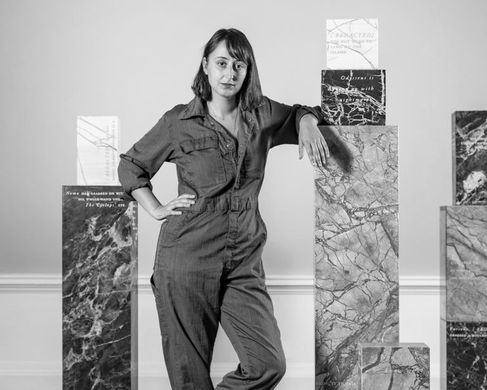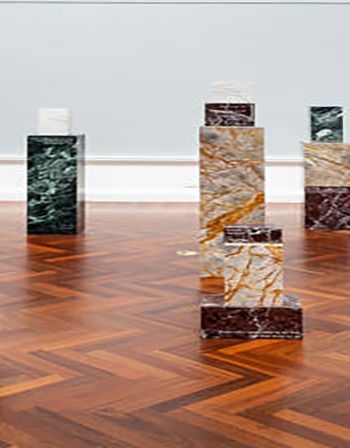Stanislava Pinchuk
Anti/Monumental
16. 7. – 5. 8. 23
What is it to be an anti/monument? Are monuments necessary, even though they so easily betray us? How do we deal with this weight of the past? How do we make new monuments? Do we make them at all? How do we keep them alive? How do we care for them?
The course aims to best express each student’s vision and artistic development in the sphere of anti/monumentalism and stone. Primarily, students will be working with the teacher and group in discussing, shaping and developing ideas and approaches throughout the three week period.
While technicians are available to develop work with carving stone itself, applicants are also encouraged to interpret monumentalism and the materials of the quarry in their own mediums; from photography, to film, dance, drawing and so on.
Students who are curious to learn new techniques, but also new ways if thinking - a preparedness to talk about our cities and landscapes, interrogate our histories and learn new methodologies of place-making.
Students in this course generally live and work in the former workers' houses on site. Everyday life in the quarry (cooking, cleaning, etc.) is organised by the students themselves. From Saturday evening, 15 July, simple dormitory accommodation is available in the quarry grounds for € 9.- per night. An invoice will be issued in advance.
key data
- Venue
- Steinbruch Untersberg
- Date
- 16. 7. – 5. 8. 23
- Requirements
- No familiarity or previous experience with stone is required. Ideally, participants are comfortable with discussing and developing ideas, works and approaches in group situations. A comfort to live in a group, and capacity to be in a dusty quarry.
- What to bring
- A sketchbook & drawing implements, sunscreen, and any tools or past works that you feel may be important to your project and process. Basic stone-working tools are provided. Each student is given an amount of stone with which to work, as well as being able to take inspiration and setting from the wider quarry.
- Teaching Language
- English
- Co-Teacher
- Leon Hölzl
Stanislava Pinchuk
Stanislava Pinchuk (1988, Ukraine) is an Ukrainian artist exploring the changing topographies of war and conflict zones. With a multidisciplinary practice that spans drawing, installation, tattooing, film and sculpture, Pinchuk surveys the ways in which landscape holds memory and testament of political events and violations of human rights. Using source materials of data, documentation, and detritus surveyed through field-work, Pinchuk’s critical practice reconsiders perceptions of geopolitical borders, migration, climate catastrophe and nuclear crises.
Currently lives and works in Sarajevo, Bosnia and Herzegovina
Website
Exhibitions
Solo Exhibitions
2022 Mordant Family Commission, Australian Centre for the Moving Image, Melbourne (AU). 2021 Archaeology of Loss: Career Survey, Fremantle Arts Centre, Perth (AU). Terra Data: Career Survey, Heide Museum of Modern Art, Melbourne (AU). 2020 The Red Carpet, Sydney Opera House, Sydney (AU). 2019 Immigration Granulation, Immigration Museum of Australia, Sydney (AU).
Group exhibitions
2023 Art Basel Encounters Commission, Hongkong (CN). 2022 Manifesta 14, Prishtina, Kosovo. Adelaide Biennial of Australian Art: Free/State, curated by Sebastian Goldspink, Art Gallery of South Australia, Adelaide (AU). 2021Emerging Topographies, Yavuz Gallery, Sydney (AU). 2020 Hybrid, Museum of Applied Arts and Sciences, Sydney (AU). Bushfire Brandalism, National Gallery of Victoria, Melbourne (AU). 2019 A World of One’s Own, Art Gallery of Ballarat, Melbourne (AU). 2018 Earth/Sky, National Gallery of Australia, Canberra. 2010 SpaceInvaders, National Gallery of Australia, Canberra. Future Tense, National Portrait Gallery, Canberra.

